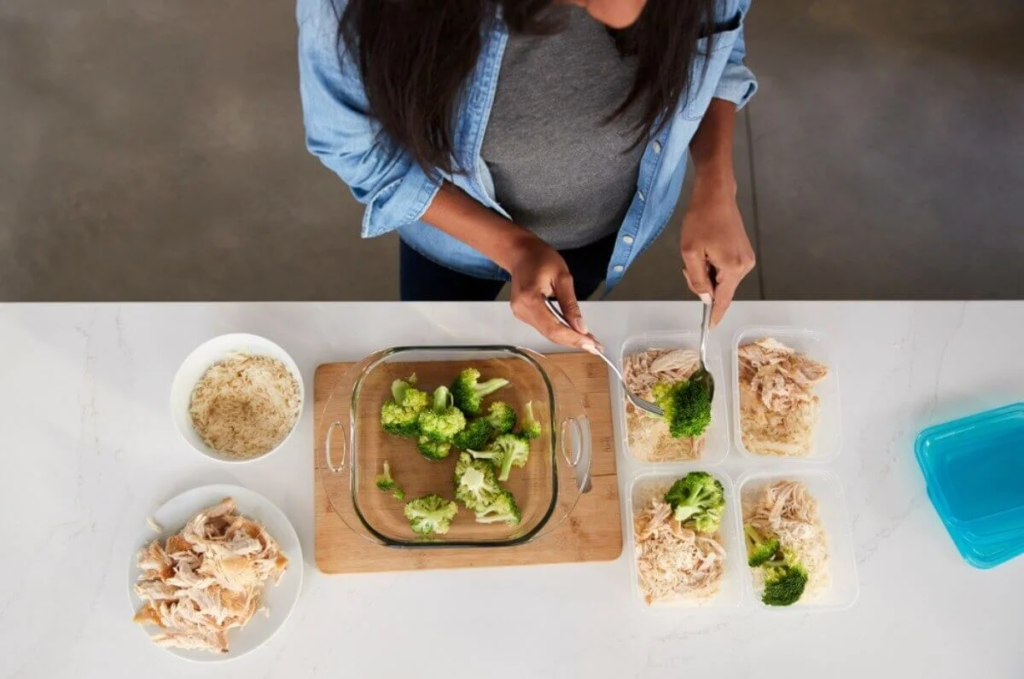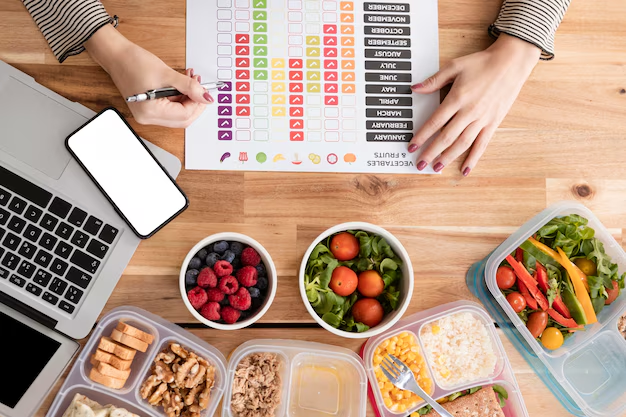Meal prepping has become a popular solution for those looking to save both time and money in the kitchen. By planning and preparing meals ahead of time, you can streamline your cooking process, reduce food waste, and avoid the temptation of expensive takeout. In this article, we’ll explore how to plan a weekly meal prep, share tips for organizing your meals, and highlight the benefits of meal prepping for both your budget and your schedule.
1. Understand the Basics of Meal Prep
Meal prepping involves preparing meals in advance so that you can enjoy home-cooked, healthy dishes throughout the week without spending excessive time cooking each day. A typical meal prep strategy involves cooking in bulk, portioning meals into containers, and storing them in the fridge or freezer for easy access.
Benefits:
- Saves time during busy weekdays.
- Reduces the need for last-minute takeout or processed foods.
- Ensures you eat balanced meals consistently.
2. Plan Your Weekly Menu
The key to successful meal prep is planning. Take some time each week to create a menu for your upcoming meals. Consider your dietary preferences, nutritional goals, and the number of meals you’ll need. Plan meals that are easy to prepare in bulk and store well, such as casseroles, stir-fries, salads, and grain bowls.
Tips:
- Choose simple recipes with few ingredients.
- Consider batch-cooking foods like rice, quinoa, or roasted vegetables.
- Make sure the meals are versatile and can be reused in different ways throughout the week.
3. Create a Shopping List
Once you’ve planned your weekly menu, create a shopping list with all the ingredients you’ll need. Having a list ensures you buy only what you need, preventing food waste and avoiding impulse purchases. Organize your list by categories (produce, protein, grains, etc.) to make shopping easier and more efficient.
Benefits:
- Reduces the likelihood of buying unnecessary items.
- Helps you stay within your budget.
- Reduces trips to the store, saving time.
4. Choose Cost-Effective Ingredients
When planning your weekly meal prep, opt for ingredients that are both affordable and nutritious. Consider buying in bulk, which is often cheaper in the long run. Frozen vegetables, canned beans, rice, and lentils are all great, budget-friendly options that can be used in a variety of meals.
Tips:
- Buy in bulk to save money on items like grains, beans, and meats.
- Choose seasonal produce for lower prices.
- Look for sales and discounts to get the best deals on ingredients.
5. Meal Prep Efficiently

The key to saving time with meal prep is doing everything as efficiently as possible. Set aside a few hours one day each week to prep all of your meals. Start by chopping vegetables, marinating proteins, and cooking grains or starches. You can also batch-cook soups, stews, or roasted vegetables that can be eaten throughout the week.
Tips:
- Use kitchen gadgets like a slow cooker, Instant Pot, or air fryer to speed up cooking time.
- Cook in bulk and store extra portions for future use.
- Invest in good-quality food containers to keep your meals fresh throughout the week.
6. Organize Your Meals for the Week
Once your meals are prepped, organize them into individual portions and store them in airtight containers. Label your containers with the date and type of meal so you can easily grab what you need each day. Consider investing in stackable containers that fit neatly in your fridge or freezer to save space.
Benefits:
- Keeps your meals organized and easy to access.
- Helps prevent food waste by labeling and rotating meals.
- Makes it easier to grab meals on the go.
7. Store Meals Properly
Proper storage is essential for maintaining the freshness and quality of your meals. Store meals in the refrigerator if they’ll be eaten within a few days, and freeze meals that need to be kept longer. This ensures that your prepped meals stay safe to eat and retain their taste and texture.
Tips:
- Store cooked meats and grains separately to avoid sogginess.
- Freeze sauces, soups, and stews in small portions for convenience.
- Use freezer bags or vacuum-sealed bags for long-term storage.
8. Focus on Versatile Ingredients
When meal prepping, focus on ingredients that can be used in multiple meals. For example, grilled chicken can be added to salads, wraps, or rice bowls, while roasted vegetables can be used in salads, sandwiches, or as side dishes. The more versatile your ingredients, the easier it will be to create diverse meals throughout the week.
Benefits:
- Reduces food waste by using ingredients in multiple meals.
- Simplifies your meal prep process.
- Offers variety without the need for extra ingredients.
9. Prepare Snacks in Advance
In addition to preparing full meals, you can also prep healthy snacks in advance to save time. Portion out nuts, cut-up vegetables, or pre-packaged snacks like hummus and crackers for easy grab-and-go options throughout the week. This helps you stay on track with healthy eating and avoids impulse snacking.
Benefits:
- Saves time during busy days.
- Helps you stick to healthier snack options.
- Keeps you energized between meals.
10. Adjust and Improve Over Time
As you continue meal prepping, you’ll learn what works best for your schedule, tastes, and nutritional needs. Keep track of what meals you enjoy and what ingredients you use most often, then adjust your menu and shopping list accordingly. Over time, your meal prep routine will become even more efficient.
Tips:
- Experiment with new recipes and ingredients to keep things interesting.
- Adjust portion sizes to fit your lifestyle and appetite.
- Track your spending to ensure you’re saving money.
Also Read: What Are The Health Benefits Of Eating A Balanced Diet?
Conclusion
Planning and prepping your meals for the week is a powerful strategy for saving both time and money. By taking the time to organize your meals, create a shopping list, and prep in bulk, you can streamline your week and avoid costly takeout or last-minute trips to the grocery store. Meal prepping allows you to enjoy healthy, home-cooked meals every day while staying within your budget and reducing food waste. Start meal prepping today, and enjoy the benefits of more time, less stress, and better health!
